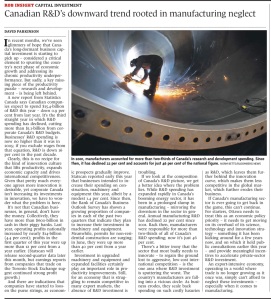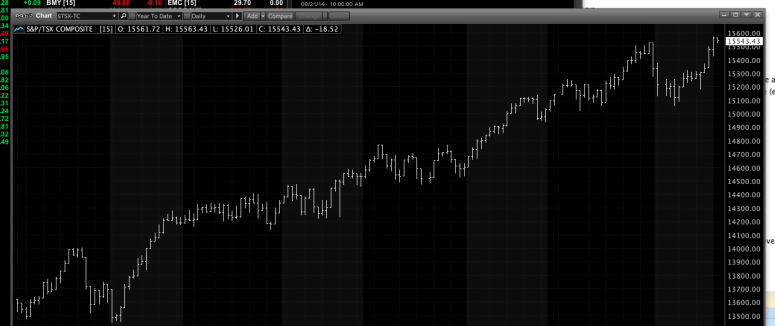If you’ve been following this blog, you’ll have noticed how I am regularly concerned about the state of the Canadian economy. And while I maintain that I have good reason for this; including fears about high personal debt, an expensive housing market and weakening manufacturing numbers, the sentiment of the market isn’t with me. As of writing this article the TSX is up just over 14% YTD, spurred on by strong numbers in the small cap, energy and banking sectors.
All this illustrates is the incredible difficulty of understanding and seeing the truth in an economy. Is an economy healthy or unhealthy? How do we know, and which data is most important? Economies produce all kinds of information and it’s frequently hard to see the forest for the trees. But even with all the secrecy around the bank’s and regulators financial misdeeds prior to 2008, the writing was on the wall that the US housing market was over inflated and that savings rates were too low and debt rates too high. And while you could be forgiven for not really understanding the fine points of bundled derivates and just how far “toxic debt” had spread, it wasn’t as though the banks had hidden the size of their balance sheets or the number of outstanding loans. It was all there for anyone to see. And people did see it and then shrugged.
One of the big fallouts of the financial meltdown was extensive criticism directed at the professional class of economist and business reporters who give regular market commentary and missed the total implosion of the financial and housing sectors. After all, how good could these “professionals” be if they can’t see the financial freight train like the one that just came through? . But I would chalk that up to overly positive market sentiment. It’s not that they didn’t see the bad news, they just assumed that other better news was more important.
Look at these two articles from yesterday’s (August 20th, 2014) Globe and Mail:
Canada losing steam in its push for an export boom
&
While these two articles aren’t exactly equal, (one is talking about Canada right now, the other is talking about prolonged growth of Canadian shipping over the coming decades) it’s interesting to note that they sit side by side on the same day in the same newspaper. For investors (professional and individual alike) it is an ongoing challenge to make sense of the abundant information about the markets without resorting to our “gut feelings”. Do we tend to feel good about the market or bad? Which headline should be more important? Here is a third article from the same day: (Click the image to see the full size article).
 Its plain to see how I feel about the state of the Canadian market (and which news I place value on), but its also possible that I’m the crazy one. Lots of Canadians disagree with me quite strongly and it is shown everyday the TSX reaches some new high. Which brings us back to investor, or market sentiment. Described as the “tone” of the market, it might be better thought as human irrationality in assessing odds and errors in estimating value. Investor sentiment plays a significant role in valuing the market over the short-term, far in excess of hard financial data. And it isn’t until that sentiment turns sour that we begin to see corrections. Coincidentally, holding an opinion contrary to the popular sentiment is quite lonely, and many portfolio managers have been criticized for their steadfast market view only to be proven right after they had acquiesced to investor complaints about poor performance.
Its plain to see how I feel about the state of the Canadian market (and which news I place value on), but its also possible that I’m the crazy one. Lots of Canadians disagree with me quite strongly and it is shown everyday the TSX reaches some new high. Which brings us back to investor, or market sentiment. Described as the “tone” of the market, it might be better thought as human irrationality in assessing odds and errors in estimating value. Investor sentiment plays a significant role in valuing the market over the short-term, far in excess of hard financial data. And it isn’t until that sentiment turns sour that we begin to see corrections. Coincidentally, holding an opinion contrary to the popular sentiment is quite lonely, and many portfolio managers have been criticized for their steadfast market view only to be proven right after they had acquiesced to investor complaints about poor performance.
Following a correction, once the positive market sentiment has been washed away, it seems obvious to us which information we should have been paying attention to. But that doesn’t mean being a contrarian is automatically a recipe for investment success. I may be wrong about the Canadian market space altogether (it wouldn’t be that shocking), and in time I will regret not placing more value on different financial news. What is far more valuable to investors is to have a market discipline that tempers positive (and negative) sentiment. An investing discipline will reign in enthusiasm over certain hot stocks, and keep you invested when markets are bad and the temptation is to run away. Sometimes that means being the loser in hot markets, but that may also mean better protection in down markets.

